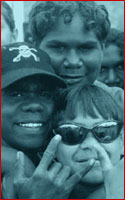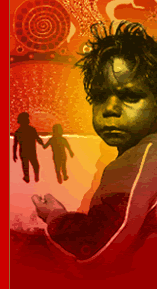| |
Child Abuse and Family
Violence
Resource Page for Aboriginal and Islander Communities
This page contains a collection
of online resources, information and contacts to assist those developing
responses to child abuse and
neglect, sexual assault and family violence, in Aboriginal and Torres Strait Islander communities.
If there is any information you would like to see on this page please
email SNAICC.
Developed by the SNAICC Resource Service.
The SNAICC Resource Servcie website will be live in July 2007

SNAICC Media and Policy Resources
SNAICC Policy Papers on child abuse
General Media Resources
Key Media sources
Publications and research online
SNAICC key reports on Child Abuse in Aboriginal and Islander Communities
SNAICC publications pages
Short
publications for communities
Australian Domestic and Family Violence Clearinghouse Indigenous Programs and Resources
The Australian Domestic and Family Violence Clearinghouse has a large online collection of publications and leaflets and other resources as well as a listing of Best Practice in Indigenous Programs.
Research on violence
against women and children in Indigenous communities
- Breaking the Silence:
Creating the Future - Addressing child sexual assault in
Aboriginal communities in NSW (2006). [HTML]
NSW Aboriginal Child Sexual Assault Taskforce
- Indigenous people reporting assault, sexual assault and family violence as problems for their community Crime facts info, no. 139, 2002 (percent)
Family violence is a problem in all sectors of Australian society, with particular attention recently being given to its occurrence in remote Indigenous communities. The Australian Institute of Health and Welfare report, Family violence among Aboriginal and Torres Strait Islander peoples, draws on data from the 2002 National Aboriginal and Torres Strait Islander Social Survey, in which approximately 9,400 Indigenous Australians aged 15 years and older participated.
- Child
sexual abuse in Indigenous communities 2003 [PDF 152KB] [HTML
version]
Stanley, Janet; Tomison, Adam M; Pocock, Julian - Melbourne, Vic:
National Child Protection Clearinghouse, Australian Institute
of Family Studies, 2003, 31p Child abuse prevention issues
no.19 Spring 2003.
Child abuse and neglect associated with Indigenous communities
cannot be understood, nor addressed, unless it is viewed from
a broad perspective which includes both historical and present
day issues. Measures centred on community based responses which
empower Indigenous Australians are needed, in order to protect
Indigenous children from the serious levels of abuse which they
are presently experiencing. (Author abstract)
- From
fostering to flubber? Australian Government directions in Indigenous
parenting and child abuse prevention.[PDF 857K]
Pocock, Julian; Tynan, Melinda. In: Knowledge into action!
Effective practice for child and family services: proceedings
of the 2004 Conference of the Association of Children's Welfare
Agencies. Haymarket, NSW: Association of Children's Welfare
Agencies, 2004
- Current
issues in child protection policy and practice: informing the
NT Department of Health and Community Services child protection
review. [PDF 564KB] Darwin, NT: Department of Health and Community
Services, 2004
This report aims to provide an overview of current issues for
Australian child protection systems, and to inform the child protection
review undertaken in the Northern Territory (NT).
- Family
violence and sexual assault in Indigenous communities: 'Walking
the talk' - ACSSA Briefing No. 4 September 2004 [HTML]
This Briefing Paper provides an overview of the key issues and
findings from recent reports and research into family violence
and sexual assault in Indigenous communities. Four sexual assault
workers across the country spoke to ACSSA about what is happening
in their service areas to address sexual assault in Indigenous
communities. An overview of the state and federal governments'
policies and reports into family violence are provided in an annotated
bibliography.
- Trauma trails, recreating song lines: the transgenerational
effects of trauma in Indigenous Australia. [Spinifex
Press] Atkinson, J North Melbourne, Vic: Spinifex Press, 2002.
After observing the severity of social problems on central Queensland
Aboriginal reserves, which were often dismissed by government
representatives reluctant to interfere, the author went in search
of a solution. This book is the outcome of an effort to conduct
research (from 1993 - 1998) that was meaningful and that would
provide practical and relevant outcomes for Aboriginal communities.
The author sought a contextual understanding of violence and trauma,
and the cultural and individual process of recovery from this
trauma. She used the culturally appropriate research approach
of dadirri, or listening to one another, to collect stories about
the trauma and healing of many Indigenous people. She considers
how violence relates to child development, family and community
fragmentation, alcohol and drug misuse, race and gender injustice,
criminal behaviour and poverty.
- 2006 Indigenous Family Violence Prevention Forum:
Men, Women and Community
Queensland Centre for Domestic and Family Violence Research
Central Queensland University, Mackay
- Family violence among Aboriginal and Torres Strait Islander peoples 2006, Australian Institute of Health and Welfare.
- Values
and ethics: guidelines for ethical conduct in Aboriginal and Torres
Strait Islander health research [PDF 310K] The document contains
guidelines for ethical health research on Aboriginal and Torres
Strait Islander peoples. In accordance with guidance from Aboriginal
people it is written around a framework of Aboriginal and Torres
Strait Islander values and principles.
- Guidelines
for ethical research in Indigenous studies [PDF 431K]The Australian
Institute for Aboriginal and Torres Strait Islander Studies has
produced these Guidelines for Ethical Research in Indigenous Studies.
The principles of the Guidelines are founded on respect for Indigenous
peoples' inherent right to self-determination, and to control
and maintain their culture and heritage.
- Stewart PJ & Pyett PM. 2005. - Victorian Aboriginal Ethics Project report, November 2005 This report outlines how Aboriginal people can have more control of the ethics of research that is carried out in, or impacts on, Aboriginal Communities in Victoria. Six different models have been developed through Community consultations, individual interviews and focus groups with key people and a literature review. Each model is described by representation, resources, expertise, power and its potential strengths and weaknesses.
- Shibasaki S & Stewart PJ. 2005. Workshop report: Aboriginal and Torres Strait Islander people involved in ethics. Darwin, Australia: Cooperative Research Centre for Aboriginal Health.
Other Research and Government papers
Aboriginal and Torres Strait Islander
family and children's lead agencies and peak bodies
Training for workers in family violence
and sexual assault
Various Australian States
and Territories
SNAICC Service directory
search results for professional training
Aboriginal legal and health contacts
- SNAICC Service Directory
Police - Aboriginal policy, service
and liaison units
Information resources online
Websites
Yorgum - Yorgum provides an alternative and cultural approach to healing Aboriginal people who have been affected by family violence, sexual abuse and the underlying causes associated.
NT Government response website Closing the Gap is the Northern Territory's Indigenous Generational Plan, aimed at closing the gap in outcomes between Indigenous and non-Indigenous Territorians.
Take Two is a therapeutic service for children and young people who have been the victims of substantiated incidents of child maltreatment.
Take Two has an Aboriginal Team that provides direct service as well as training and consultation to other Take Two clinicians in order that all staff are able to work sensitively and effectively with Aboriginal and Torres Strait Islander children, families and carers.
The Australian Domestic and Family Violence Clearinghouse has a large online collection of publications and leaflets and other resources as well as a listing of Best Practice in Indigenous Programs.
Domestic
Violence and Incest Resource Centre (DVIRC)
Australian
Centre for the Study of Sexual Assault (ACSSA)
National Child Protection Clearinghouse
Aboriginal and Torres Strait Islander Resource Services and Support Units
Libraries and research
collections
State/Territory departments responsible
for child protection
Also see the National
Child Protection Clearinghouse which has a broad range of information
and resources.
Help Lines
Who should you contact
if you want to report a child or family who may need help?
If you know or suspect
a child is being mistreated, you should report your concern to the
child protection authority in your State or Territory.
It is also a good idea
to report your action to the Aboriginal and Torres Strait Islander
agency in your area that deals with these issues.
For advice, or to report
your concern, call the following agency in your State/Territory
(24 hour services):
ACT
- 1300 556 729
SA - 13 14 78
NSW DoCS Helpline - 132 111
TAS - 1300 737 639
NT - 1800 700 250
VIC - 13 12 78
QLD - 1800 177 135
WA - 1800 199 008
Kids Help Line - telephone 1800 55 1800
Kids Help Line is a free and confidential, 24-hour telephone counselling service for 5 to 25 year olds in Australia.
Domestic Violence and Incest Resource Service Help Index
|

|






